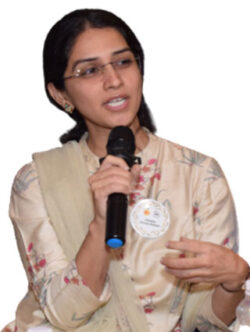VIHASA
Values in Human, a Spiritual Approach
Oriental Institute of Management believes that for holistic development of students, they also need to be exposed to life skills needed for a meaningful life and career as a human being. Sensing this need, OIM conducts unique VIHASA Modules for its MMS Students with an objective of preparing students for success in life. Unique feature of VIHASA is that it is an action based, learning-by-doing methodology which ensures learning goes beyond the classroom.
VIHASA is a modular Life-Skills development program comprising experiential exercises and opportunities for reflection and self-enquiry, through which students can identify their own core values and revitalize them. An effort is made to bring about shift in the mindset of students and
create belief systems that enable growth, success and happiness for students in their life.
It inspires participants to conjure courage to face their failures or shortcomings and use it to become
better versions of themselves.

Ritu Thakkar
VIHASA & HAPPINESS COACH

Compassion

Self-control

Better Team-work

Self-awareness

Time Management

Leadership Capabilities

Conducive work-environment

Better professional relationships
7 Tools are used in VIHASA for higher engagement and enhanced learning.

Visualisation:
Involves using the mind to create positive images which can help to address past negative experiences and associated feelings of failure or frustration and create aims for the future. Visualization exercises can help to build participants’ self-respect and positive attitudes.

Reflection:
Reflective practice involves learning from past experience to evaluate concerns and improve clinical practice. The spiritual approach to reflection helps participants to take a calm, detached view of themselves, rather like an observer, so that they can examine their own emotional reactions and release them. New and creative ways of approaching challenging situations can then be considered from a place of clarity. Reflection is used to identify and affirm positive experiences as well as facilitate a degree of detachment.

Play:
It introduces the idea that it is legitimate to experience fun and laughter as part of the learning process. Being playful is being spontaneous and carefree, with a willingness to let go of barriers and overcome difficulties. While participants may feel inhibited at first, playing simple games can be a moving experience, connecting people at a deeper level and allowing everyone to ‘just be themselves’. The sense of lightness inherent in play encourages tolerance in our listening and softness in our judgements.

Creativity:
It encourages the discovery of new solutions. As a spiritual skill, it emphasizes the premise that ideas come to us when we give ourselves silent space and let go of our preconceptions. As part of the Values in Healthcare program, participants are encouraged to experience the creativity which can flow though drawing, writing poetry and visualization. Facilitators are encouraged to experiment in exploring values in creative ways. For everyone, the sessions may involve taking risks by behaving outside our normal roles. However, the experience of heightened creativity and its application to problem solving will be a positive learning outcome.

Appreciation:
As a spiritual skill, it values what works best in individuals and groups, drawing on existing strengths and shared values to seek solutions, rather than focusing on the problem and apportioning blame. In healthcare the emphasis is often on developing a critical attitude. While this is essential in technical medical care, practicing appreciation can help participants recognize the value of the human contribution and encourage co-operation between colleagues and within teams.

Listening:
Quality of how we listen can bring benefit not only to those being listened to, but to ourselves as listeners. Listening as a spiritual tool involves participants explore deep listening, and requires inner peace. Only then can full attention and focus on what a person is saying be given, with an open heart and without judgement.

Meditation:
This program involves participants being silent at times and using that time to learn about their mind and their thoughts. They are encouraged to employ positive and peaceful thoughts to experience quietening their minds and bringing calm to their work.

